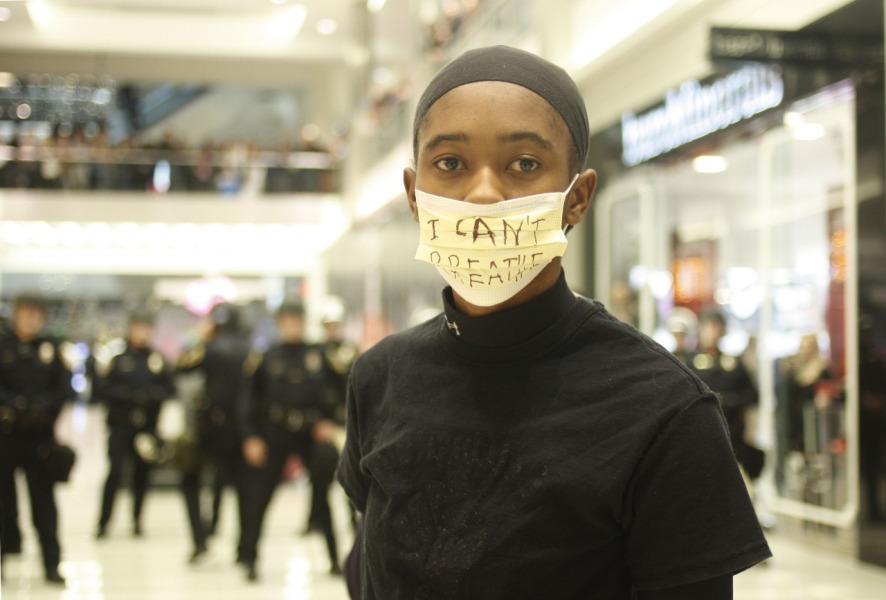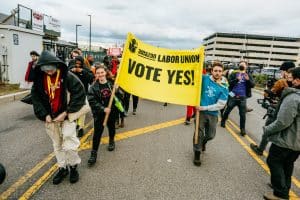Since the beginning of 2020, two political earthquakes have battered the U.S.: one is the economic, social and political consequences of the Covid-19 pandemic. The other is the uprising against racist police repression. The combination of these two game-changing events are transforming the parameters of class struggle in the U.S. Here are six aspects of the transformation underway.
1. A shift to the left.
The first element to note is that the ongoing uprising against police brutality and systemic racism represents a shift to the left in the political situation. Not only have there been large (in some cases, massive) mobilizations for three weeks in a row in dozens of cities across the U.S., but also, and this is the key, the support for those mobilizing despite the risk of contracting COVID-19 is massive. Polls show that most people recognize and condemn racist police brutality — and these numbers climb to over 80 percent among young adults. Such a deep questioning of the capitalist state’s first line of defense marks a change in the way people think about politics and the government.
In 2016, the election of Donald Trump marked a swing to the right in the political situation in the U.S. However, as we pointed out in these pages, the general situation was characterized more by polarization than a unidirectional right-ward swing. In other words, Donald Trump was advancing politics that were more reactionary than the real political consciousness among working-class people and the balance of forces between classes.
Now, we see a shift to the left signaled by masses of people reckoning (once again) with the reality of enduring, brutal racism in the U.S., and condemning the police. It is no wonder that Trump has been completely out of step since the protests began. Instead of paying lip service to liberal ideas of democracy and equality, he has fanned the flames with Twitter threats to protesters and a refusal to admit any police wrongdoing — thus, he is sinking in the polls.
2.Two paper tigers go down in flames.
Two mainstays of capitalist democracy faced widespread challenge: the despotism of capital in the workplace and the respect for law and order — in particular, law enforcement agents. As the pandemic spread in the United States taking the lives of health care and other frontline workers lacking appropriate protection, many lost their fear to confront the bosses. The contradictions between those who had to toil everyday to maintain an income (risking their lives and that of their families) and those who hired people to work for them, and extract profits without having to put their necks out, surfaced in stark relief. Health care workers in New York hospitals called out their CEOs who had taken safe retreat in Florida. . Amazon workers denounced their unsafe working conditions while Jeff Bezos added billions to his fortune.
A couple months into the pandemic, after the video of George Floyd’s execution emerged, public opinion soured for “law and order” politics. Not that cops were particularly well-received before Floyd’s heinous murder at the hands of Minneapolis police . But the combination of the racist murders of George Floyd and Breonna Taylor (along with Ahmaud Arbery, who was killed by a former police officer) with the reckless repression of protesters, resulted in further delegitimation of the forces of order. The health care workers that were hailed as heroes at the peak of the pandemic are now being arrested by the NYPD. Masses of protesters defied the curfews, denounced police brutality and the public opinion shifted rapidly to a strong support of the mobilization for Black Lives that indicted police action.
3. Cops are no friends of labor.
The fight within labor’s own ranks to expel cops from our organizations has gained renewed traction. It started with the president of the Minnesota AFL-CIO calling for the president of the Minnesota police union to resign, a call echoed by others in Minnesota and elsewhere. Some unions went beyond that, demanding the expulsion of police unions from the AFL-CIO and its affiliates (the International Union of Police Agents is directly affiliated with the AFL-CIO, but other unions like AFSCME, CWA and SEIU represent law enforcement officers). This is a necessary debate within our unions and can elevate the class consciousness of union members: The police have always been and will always be an enemy of the working class, of organizers and activists who are pushing the limits imposed by the boss and the government, who engage in legal and illegal actions to fight for workers’ interests. The police will always be an enemy of working-class minorities, those most oppressed among workers.
And this aspect has a particular bearing on the left’s strategy and tactics. Some confused socialists argue that cops are ‘workers in uniform,” ignoring the fact that the police have a special role to play in a capitalist society: to repress striking workers, to terrorize and discipline those most oppressed among our ranks and to discourage them from rebelling against a deeply unjust system. In order to win over the most oppressed in our class — and to tap into a potentially revolutionary force — for a socialist perspective, we need to show that the working class and its organizations can and will fight to redress racism, sexism and all kinds of oppression. While union bureaucrats are content with maintaining their dues paying membership, even if there are cops among them, to keep their union running, we socialists have to fight for workers’ hegemony: this means demonstrating that workers organized as a class are the only ones that fight to the last consequence to end all kinds of oppression. If we take advantage of the current outrage against the police and transform it into a sweeping expulsion of cops from the labor movement, unions will immediately be stronger and in a much better position to fight the racist capitalist system.
This push comes at a moment when unions are under pressure to be transformed, democratized, and turned more militant. During the Covid-19 pandemic, there was a wave of wildcat strikes, work stoppages and walkouts. In some cases, like the Instacart strike, these actions were national phenomena. With the current economic crisis , the ongoing spread of the novel coronavirus, and the radicalizing effect of the anti-police protests, we can expect to see more cases of rank and file movements challenging their union leaders.
4. Co-optation from above with some victories for the movement.
Many municipalities have moved to put a ban on chokeholds (although many had already done this years ago), impose minor cuts to their police budgets, halt the transfer of military equipment to local police departments, and nominally increase some level of accountability. These moves are all largely symbolic concessions if we take into account that a large sector of protesters is demanding that the police be abolished altogether. And let’s not forget that Eric Garner was choked to death by a police officer in 2014, 11 years after New York City passed a ban on chokeholds. Under insurmountable pressure from the movement against police brutality, a veto-proof majority of the Minneapolis City Council vowed to disband the Minneapolis Police Department. However, details on what would replace it are still unknown. It is clear, however, that there can be no abolition of law enforcement under capitalism. As long as our society is divided in classes, with one enjoying absolute control over the productive resources and the other one, comprising the vast majority of us, thrown into the labor market, scrambling to survive, with many among them forced to endure chronic unemployment and deprivation, there will be the need for a repressive apparatus of the state.
At the same time the questioning and possible repeal of qualified immunity, the halt on the transfer of military equipment to police, if made effective, and the formal restriction on the use of force by the police, including the use of crowd control weapons, are concessions that strengthen the movement. More scrutiny, stricter limits to police behavior and more accountability for law enforcement officers implies a reduction in the fire-power of the state. It sets boundaries on the ‘legitimate use of violence’ the state can use against anyone questioning the regime.
5. Radicalization of a new generation of socialists.
Up to the beginning of this year, a young generation of socialists had been tempered in a slow-cooker, smouldered by the decline in their quality of life with respect to that of their parents, mobilized by the ascent to the Oval Office of a racist bigot and galvanized by electoral campaigns, notably by Bernie Sanders’ bids for president. Now there is intense class struggle. A new period opened up with the teachers spring of 2018-2019 and the fight against unsafe conditions during the pandemic ushered in another uptick in class struggle. Yet, the anti-racism protests after the murder of George Floyd increased the intensity of class struggle by orders of magnitude. This new generation of socialists are now participating in clashes with police, going through an experience with Democratic governors and mayors who have nothing better to offer than their Republican counterparts. There is a prime opening for the socialist left to intervene in these struggles with its own banners, to put forward an anti-capitalist program — expressed by its own independent socialist candidates — and to help shape and coordinate the movement nationally. The only organization that could play that role today is the DSA, but its efforts have fallen short of what the conjuncture demands. A convergence of the new socialist movement and the movement against racism and police brutality has the potential to permanently reshape American politics.
6. The economy will keep representing a disruptive factor.
Two weeks ago, the sudden decline in unemployment surprised pretty much everyone. Even when the Bureau of Labor Statistics admitted that the unemployment rate for May had been underestimated due to a “misclassification error,” Trump hailed victory. Anyone who is not kidding themselves knows that economic recovery is still very far away in the horizon. Even though millions of people were denied any government relief, the stimulus checks and the expanded unemployment benefits are buffering the impact of the crisis on working-class people. The money from the stimulus check is far gone, and the unemployment benefits will not last for the duration of this crisis. It is likely that we will see more unrest as the crisis lingers on and workers and small shop owners find it harder and harder to make a living.
In addition, the stock market had recovered almost all the value lost in the tragic days of March, but the instability has not disappeared. Last week, stocks fell again, showing that volatility is still the rule. These oscillations are only a harbinger of a major crash that is looming on the global economy. As Michael Roberts shows, the good performance of stock prices is a direct result of a massive injection of money by central banks (‘power money’), which at the end of 2020 would account for almost a quarter of the world’s nominal GDP. In other words, booming stocks are only the visible expression of a global financial bubble leveraged by central banks. The political consequences of a financial crash in the near future, against the background of widespread unemployment, mass mobilizations and a questioning of the state — at least, its repressive arm — are difficult to fathom.











